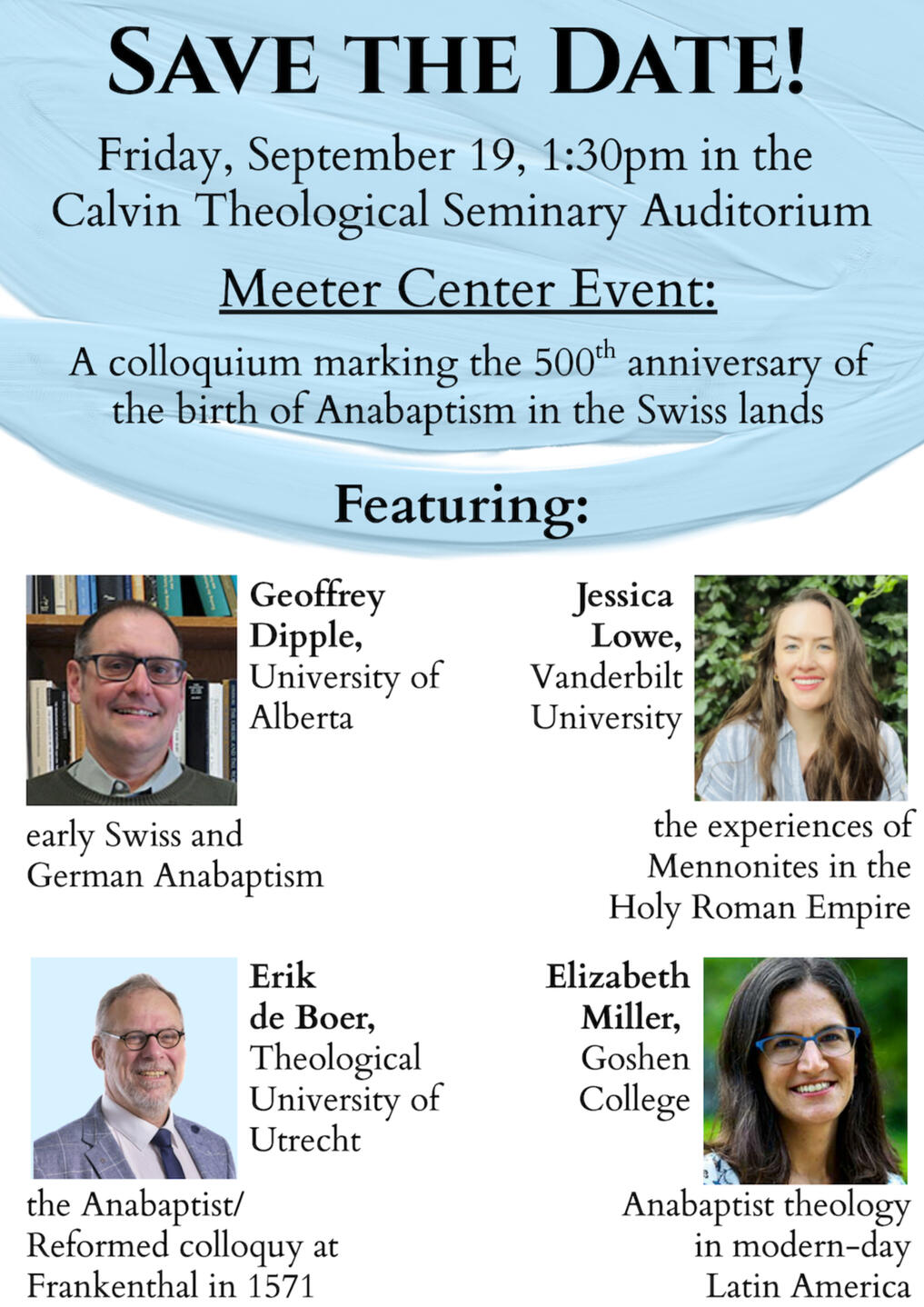Scroll down to sign up now!
September 19, 2025
Anabaptism at 500: Origins, Encounters, and Legacies

The year 1525 marked the first Anabaptist practice of believers' baptism in Zollikon, near the Swiss city of Zurich. Now, five hundred years later, we want to mark this anniversary by engaging with the history of Anabaptist thought and practice and its impact over the past five hundred years.

You are warmly invited to join us ...
for a half-day conference to mark the 500th anniversary of the start of Swiss Anabaptism (1525).This event will take place on Friday, Sept. 19, starting at 1:30 PM at Calvin Theological Seminary (3233 Burton St. SE).We have four presentations (by Geoffrey Dipple - University of Alberta, Jessica Lowe - Vanderbilt, Erik de Boer - Theological University of Utrecht, and Elizabeth Miller - Goshen College), a buffet dinner, and a panel discussion.Registration: $25 for the afternoon presentations, or $40 including the buffet dinner. Scroll down to sign up today!

Elizabeth Miller:
From the ground up: Latin American Anabaptist theological construction in the late 20th Century
Recent research in Latin American Christianity has identified the degree to which Latin American progressive evangelicalism was forged within transnational networks like the Fraternidad Teológica Latioamericana. Yet Latin American Anabaptists were largely absent from these spaces, instead developing contextual Anabaptist theologies through the practice of congregational ministries and in relationship and conversation with Anabaptists across Latin America who shared similar socio-political challenges. The theological innovation from Latin American Anabaptists in this period contributes to an expanded understanding of Anabaptism in the present.
Geoff Dipple:
What Are We Commemorating in 2025?
This paper will survey the origins and development of the Anabaptist movement in Switzerland and southern Germany beginning in 1525. In the process it will reflect on what these developments mean for the nature and history of Anabaptism.
Jessica Lowe:
“A watchword for seditious men”: Anabaptism and minority privileges in the Holy Roman Empire, 1525-1695
“Anabaptist” (“re-baptizer”) was a powerful pejorative, one that religious opponents and secular authorities invoked to condemn the first adult believers’ baptisms, in 1525, as both heretical and seditious. This paper will examine the fear of “re-baptism” as it recurred in disputes over taxation and in negotiations over property and protection — that is, in the documents that nevertheless facilitated the toleration of Anabaptists and Mennonites in the Holy Roman Empire, for centuries to come.
Erik de Boer:
Was the Colloquy between Reformed Ministers and Anabaptist Leaders in Frankenthal, the Palatinate (1571), a Friendly Discussion or a Public Battering?
About the Meeter Center
The Meeter Center houses one of the world’s largest collections of materials on John Calvin, Calvinism, the Reformation and early modern studies. The Center, jointly supported by Calvin University and Calvin Theological Seminary, invites you to explore the world of John Calvin and the Reformation. The Center's extensive resources and friendly personnel facilitate research on Calvin's thought and impact in his own time and today.You can find out more about who we are and what we do here: calvin.edu/meeter.